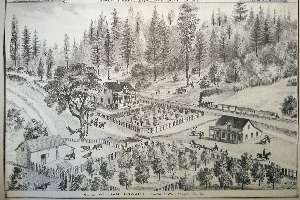 |
Caroline Kolmer & William Howard | Page last modified: |
 |
Caroline Kolmer & William Howard | Page last modified: |
Caroline was born in North Carolina (USA), 31 December, 1838. She was the youngest child of Michael & Josefa Kolmer who had emigrated from Endingen, Baden, Germany, in 1833. In about 1841 the family moved to Missouri. Four years later they crossed the plains, arriving at Sutter’s Fort in Sacramento, California, in late October, 1845. In early 1846, Caroline’s older sister, Josephine, joined Wilhelm Benitz of Fort Ross, California. At about that time the Kolmer family settled in a valley that still bears their name (anglicized to Coleman) south-west of present day Occidental, California. In 1850 or 1851, the Kolmer family relocated to a farm at Timber Cove, given to them by their son-in-law. On the northern edge of Benitz’s property, it was close to Fort Ross. This is where they were living at the time of Caroline’s impulsive marriage. Two months shy of her 17th birthday Caroline unexpectedly married William (Dutch Bill) Howard on 3 October, 1855. Her sudden decision and choice of husband infuriated her father for, by all accounts, Dutch Bill was a colorful character.
Dutch Bill was not Dutch but Danish and his name was not his but that of the captain of a merchant ship on which he had been a sailor. He was born Christopher Thomasen Folchmand on October 23, 1823, in Rønne on the Danish island of Bornholm in the Baltic Sea. He was 32 years old when he married Caroline - twice her age. (Variants on his surname include: Thomasen: Thomsen, Thomas; Folchmand: Folkmand, Folkmann, Faulkner.)
According to county records, they were married in Bodega Township — the township in which his farm was located. However, according to three accounts (see below, & his bio), they were married at the home of Alexander Duncan, Salt Point, spontaneously and without her father’s permission.

Howard Residence - Occidental, CA
Historical Atlas Map of Sonoma County,
by Thos. H. Thompson & Co., 1877
At Sonoma Co. Registrar's Office
Santa Rosa, CA
A former seaman and miner, Dutch Bill owned a farm he’d bought in 1850 on shares with a partner, Charles Roamer, next to the settlement that later became Occidental. In fact, he was one of two founders of that village, which for a time was known as Howard’s Station. We strongly recommend you read the history pages on the Occidental (Bodega township, Sonoma county) web-site for a fascinating account of his activities. During the late 1860’s and early 1870’s their Benitz nephews would come for extended visits at the farm. According to Alfred Benitz’s biography, it took them several changes of train and coach to reach Howard’s Station from Oakland.
William and Caroline had 9 children, all living with them in 1880 (see their family tree). Caroline died at the age of 43 on Aprill 22, 1882. Dutch Bill lived another seventeen years. He remarried, lost his farm due to financial reverses and became a musician in San Francisco, where he died at age 67 on March 17, 1899.
The following account of their wedding is taken from the biography of Alfred Benitz, nephew of Caroline Kolmer: “Alfred Benitz: Pioneer, Sportsman and Gentleman”, pages 28-30.
Late in the year 1857, Mrs. Benitz' father, Michael Kolmer, died after several years of a steady bout with the demon Rum, which ruined his health and ate up his fortune. One of the stories told about him at the time of his death was his refusal to forgive his daughter, Caroline, for the unorthodox manner of her marriage. The story of some interest in itself as it illustrates one of the “mores” of frontier life.
When Caroline took the step that enraged her father, there were no resident clergymen in California, or in the rural districts, at least, and it was an important social event when one would make the long and difficult journey to the remote areas from the nearest large city to legalize the various unions that had occurred since the visit of the last minister. Prior to the visit of the minister, most marriages were formalized only by the mutual consent of the principals and had the sanction of neither law nor church. When the news spread that a minister was en route, all the newly-weds were collected in the most accessible town-hall for a mass ceremony, which invariably was made the occasion for feasting and dancing.
Such a collective ceremony duly came to pass at Sonoma, and of course everyone for miles around went to the party, including William and Josephine Benitz who took Caroline with them. At the end of the evening, the minister made a speech in which he thanked all members of the community for their hospitality, and particularly thanked the new bridegrooms for their generosity in the matter of fees. In fact, he said, he was so impressed by this generosity that he offered then and there to marry free any other young couple who cared to step forward.
At this, William Howard, one of the young swain of the neighborhood who had been seeing quite a bit of Caroline, approached her and murmured into her ear. She said yes, so they were married on the spot, using one of the rings from the platform curtain as a wedding ring.
It was this entirely unforeseen marriage that caused Michael Kolmer to fly into a rage. When he heard the news, he rushed to Caroline’s room, tossed all her furniture and clothes into the yard where he made a bonfire of them and vowed that he would never see or speak to his daughter again. He kept this harsh vow for several years, but eventually relaxed it enough to seek Caroline and speak to her, but he never did completely forgive her.
© Peter Benitz (Benitz Family)